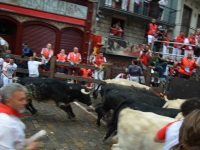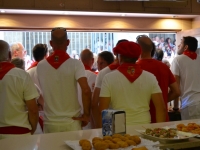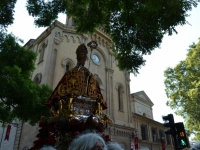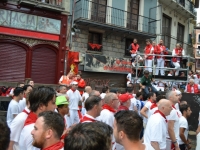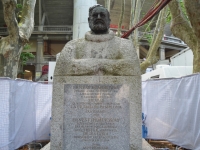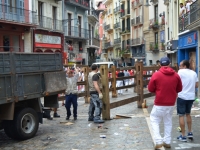Travel
The spirit of Hemingway fly over Pamplona
The city celebrates his Sanfermines
USPA NEWS -
On 6th July, 1923 American writer Ernest Hemingway arrived to Pamplona, Northern of Spain, and fell in love with the Sanfermines. From that first visit was born 'The Sun also rises,' the first seccessful novel by the young Hemingway. Pamplona celebrates these days his Sanfermines and the spirit of Hemingway is present throughout the city.
The festivities of San Fermín began on Friday with the traditional Chupinazo, the rocket launched to announce the parties, which sets off 204 hours of uninterrupted festivities. The start of the holidays is one of the most iconic and popular events in the program, explains Pamplona City Council, responsible for some festivities that host 490 events, host 1.45 million people and generate 4,000 million impacts on Twitter. But the biggest spectacle of the Sanfermines are the encierros, where 17,126 people run in front of the bulls. 41% of the runners are foreigners, 14% Americans lovers with the Sanfermines as, in his day, Hemingway was.
The encierro is a fast, violent and tense race in just a few minutes. The encierro is held at 8:00 every morning from 7th to 14th July. The most tragic encierros was in July 10, 1947 and July 13, 1980 when the bulls 'Semillero' and 'Antioquio' each killed two runners. In 1995, 13th July, the American runner Matthew Peter Tasio, 22, from Illinois, was gored in the Plaza del Ayuntamiento by the bull 'Castellano' of the Torrestrella cattle ranch. In all the modern history of the encierros, 16 people have lost their lives.
The encierros end in the bullring of Pamplona. At the entrance, a large bust of Hemingway reminds the writer. Hemingway was in Pamplona nine times, he ran the encierros and was turned by a bull without consequences. The writer loved Pamplona and the Sanfermines. After him, many Americans have followed in his footsteps and today, there are groups of young Americans running the encierros, eating and drinking in the streets and enjoying the concerts that take place in the city.
Gastronomy is important in the Sanfermines. It is eaten in bars, in the street, in the booths of associations and regional houses... It is eaten everywhere and it is drunk too. Pamplona, “‹“‹a city of just over 200,000 inhabitants, receives more than a million visitors eager to enjoy this week. Hotels are filled, but many visitors, especially young people, sleep in parks, train and bus stations and private homes. Because Pamplona opens its doors to the stranger so that nobody feels like a foreigner in the Sanfermines.
The party is for everyone, but the procession is for the people of Pamplona, “‹“‹a sign of their faith and their respect for traditions. Thousands of people gather in the streets to see San Fermín in procession, accompanied by the authorities. San Fermín is patron of the Navarra region, an honor he shares with San Francisco Javier. San Fermín de Amiens was born in Pamplona in the third Century of our era and was bishop of the French city of Amiens. His ideas took him to jail, where he died beheaded. Its festival is celebrated on July 7 and, over the centuries, the original cattle and commercial holiday was transformed into a religious holiday. Hemingway gave Pamplona an important impulse and the city thanks him with a statue "to Ernest Hemingway, winner of the Nobel Prize for Literature, friend of this city and lover of its festivities, who knew how to discover and transmit The City of Pamplona , San Fermín, 1968."
Liability for this article lies with the author, who also holds the copyright. Editorial content from USPA may be quoted on other websites as long as the quote comprises no more than 5% of the entire text, is marked as such and the source is named (via hyperlink).

